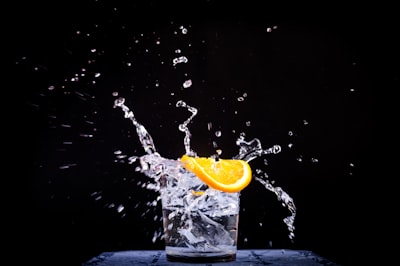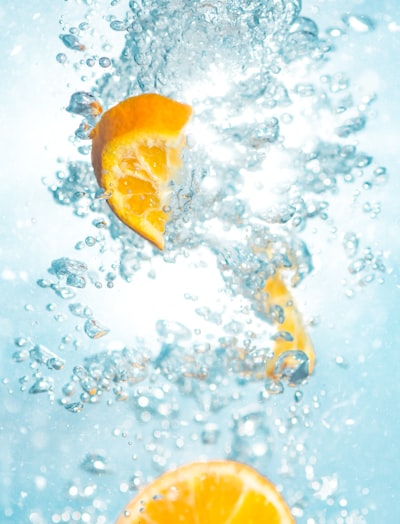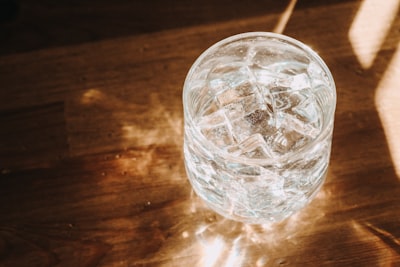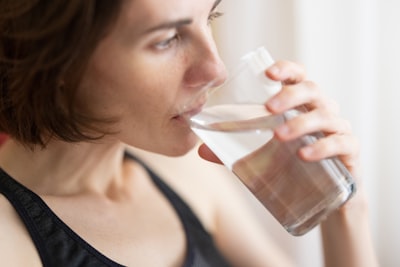Does Sparkling Water Hydrate You? Fact V.S. Fiction.
We all know the importance of maintaining proper hydration levels, but what about when you crave something bubbly and refreshing? Enter sparkling water, the seemingly perfect alternative to plain old H2O. But does it really hydrate you? In this blog, we dive into the basics of hydration and how it works. Then, we explore the sparkling water phenomenon; defining it, comparing its benefits to regular water, and analyzing its nutritional facts. We'll also answer the burning question: Does sparkling water provide adequate hydration? One study investigated the hydrating effect of 13 drinks, including sparkling water, by establishing each drink’s beverage hydration index (BHI). The BHI evaluates the volume of urine produced by any drink compared with still water. The study concluded that sparkling water was as hydrating as still water and maintained hydration levels. Finally, we'll discuss the health implications of sparkling water beyond just hydration and whether switching to sparkling water could improve your overall health. So before you reach for that can of bubbles, grab your (and my) favorite IV drink and read on to learn everything you need to know about sparkling water and hydration.
Understanding the Basics of Hydration
Proper hydration plays a vital role in maintaining overall health and well-being. Water not only helps regulate body temperature but also supports essential bodily functions. The impact of hydration extends beyond physical well-being, as it influences energy levels, cognitive function, and even athletic performance. Conversely, dehydration can lead to fatigue, dizziness, and other health issues. Therefore, it is crucial to consume an adequate amount of water throughout the day to stay properly hydrated. After deducting the roughly 20 percent of that amount that comes from the food we eat, that leaves approximately nine 8-ounce (oz) cups of liquid a day for women and 13 8-ounce (oz) cups a day for men. Experts still agree that approximately eight cups of water a day is a good rule of thumb.
Importance of Hydration and How it Works
Proper hydration is essential for maintaining optimal bodily functions and overall health. Water plays a vital role in digestion, nutrient absorption, and the removal of waste from our bodies. By staying adequately hydrated, we can improve our concentration, focus, and cognitive function. Hydration also supports joint lubrication, organ function, and the health of our skin. It helps regulate body temperature and prevents heat-related illnesses. Ensure that you prioritize hydration for a healthy and thriving lifestyle.
The Sparkling Water Phenomenon
Sparkling water has become a popular choice for those seeking a refreshing alternative to traditional beverages. Its bubbly and fizzy experience can be enjoyed on its own or mixed with other ingredients. With a wide variety of flavors available, sparkling water offers a versatile beverage option. Many people appreciate the sensation and taste of carbonation in sparkling water, making it an enjoyable choice. Moreover, sparkling water can be a healthier alternative to sugary sodas and sweetened drinks. It's important to read the nutrition label because many brands are not just carbonation and water, but also contain added flavorings, sugars, and citric acid.
Defining Sparkling Water and Its Varieties
Sparkling water, infused with carbon dioxide gas, creates bubbles and a fizzy texture. Varieties include seltzer water, club soda, and tonic water. Seltzer water is carbonated without added flavors or minerals. Club soda contains potassium sulfate and sodium bicarbonate for enhanced taste and to cater to different preferences. If you’re keeping a close eye on your blood pressure and sodium intake, it’s important to remember that a single 12-ounce can of club soda contains 75 milligrams (mg) of sodium. Tonic water, often used in cocktails, contains quinine. These options offer a wide variety of flavors and can be enjoyed on their own or mixed with other ingredients. Sparkling or seltzer water is a common type of carbonated water that is tap water that’s been filtrated and artificially carbonated.
Sparkling Water (Soda) Versus Regular Water
Regular water, the essential choice for hydration, contains no additives or flavors. On the other hand, sparkling water offers a bubbly and fizzy experience that some individuals prefer. Both options can quench thirst and hydrate the body effectively. While regular water remains the go-to choice for hydration, sparkling water adds a refreshing twist. The decision between the two depends on personal preference and individual needs.
Which is More Beneficial for Your Hydration Needs?
When it comes to hydration, both sparkling water and regular water can do the trick. While regular water is a simple choice without any added ingredients, sparkling water offers a bit of flavor and carbonation for those who prefer it. Ultimately, the choice depends on personal preferences and health goals, as long as you prioritize staying hydrated. If you want to DIY, try adding a squeeze of lemon or another citrus, or even top it with raspberries for a visually-appealing treat that will brighten up even the most mundane weekday afternoon. For a more economical and eco-friendly option, consult with a dietitian and invest in a soda maker like a SodaStream Fizzi One Touch.
Does Sparkling Water Provide Adequate Hydration?
Sparkling water can contribute to hydration and meet daily fluid intake needs. However, it's important to note that carbonation may cause some to feel less satisfied and drink less water. It's still recommended to consume plain water as the primary source of hydration. Balance sparkling water with regular water intake and pay attention to your body's cues for proper hydration. Studies suggest that the effervescence of sparkling water strongly enhances its ability to curb thirst, which may lead to people drinking less water (1, 11). According to the U.S. Department of Agriculture (USDA), men should get 125 ounces (3.7 liters) of total water per day and women 91 ounces (2.7 liters), which includes water from food (10).
Nutritional Facts About Sparkling Water Beverages
When it comes to nutritional facts, sparkling water is a great option for those looking to increase their daily water intake. It is typically calorie-free and doesn't contain any added sugars, making it a refreshing choice for individuals on a low-calorie or sugar-controlled diet. Some varieties may have added flavors or natural essences for taste. However, it's important to read the nutrition label on your sparkling water and avoid those with added sugars, as sugar-sweetened varieties are linked to obesity and type 2 diabetes. By opting for sparkling water without added sugars, you can enjoy a hydrating beverage that helps you stay on track with your health goals.
Are All Sparkling Waters Equally Hydrating?
Not all sparkling waters are equally hydrating. While they can contribute to hydration, some varieties may have added minerals or flavors. It is important to read the label and choose options that align with your hydration goals. Some brands offer sparkling water with added electrolytes, which can aid in hydration. Ultimately, the hydrating effects will depend on individual preferences and needs.
Health & Nutrition Implications of Sparkling Water Beyond Hydration
Sparkling water is generally considered safe and does not pose significant health risks. However, excessive consumption of carbonated beverages may cause discomfort like bloating or indigestion. It's best to consume them in moderation and listen to your body. If you have underlying health concerns, consult a healthcare professional for personalized guidance. Enjoying sparkling water as part of a balanced diet can be a refreshing and hydrating choice.
Can Switching to Sparkling Water Improve Your Health?
Discover the potential health benefits of incorporating sparkling water into your hydration routine. Explore the refreshing and hydrating qualities of carbonation and learn about the various flavors and options available. Consider the impact of added sugars and artificial sweeteners in sparkling water for your overall health.
Frequently Asked Questions
What about sparkling mineral water?
Sparkling mineral water, unlike regular sparkling water, contains a significant amount of minerals like calcium, magnesium, and potassium. These minerals can contribute to hydration and provide health benefits. However, the carbonation in sparkling mineral water may cause bloating or discomfort for some individuals. Remember to stay hydrated with enough water, whether still or sparkling. The amount of minerals in sparkling mineral water can differ from drink to drink but these minerals are natural and not added.
What’s behind the claims that alkaline water will “energize” and “detoxify” the body and lead to “superior hydration”?
Claims about alkaline water promoting "energy", "detoxification", and "superior hydration" lack scientific evidence. With a higher pH level, alkaline water is believed by some to have health benefits. However, the body's natural pH balance remains unaffected by alkaline water. No evidence supports superior hydration from alkaline water.
Are there any negative effects of drinking too much sparkling water for hydration?
Excessive consumption of sparkling water can lead to bloating and discomfort. It may also cause acid reflux due to the carbonation. While sparkling water can hydrate, it may not be as effective as still water. Balance your intake with still water for optimal hydration.
What is the difference between mineral water, seltzer, and tonic water when it comes to hydration?
Mineral water contains essential minerals like calcium, magnesium, and potassium for hydration. Seltzer is carbonated water without additives or minerals, making it a calorie-free option. Tonic water isn't ideal due to quinine and added sweeteners. Both mineral water and seltzer are better choices for hydration.
Does drinking cold or room temperature sparkling water have a different effect on hydration?
The temperature of sparkling water doesn't impact its hydrating properties. Carbonated water can be as hydrating as still water. However, excessive consumption may cause bloating or discomfort. Listen to your body and drink plenty of water, regardless of its carbonation level.
Why is it so hard to drink plain water?
Drinking plain water can feel boring or tasteless, making it difficult to stay hydrated. Busy schedules can also lead to forgetting to drink water. To make it more enjoyable, try adding fruit or herbs to your water, using a reusable bottle, and setting reminders to increase your intake.
Conclusion
In conclusion, when it comes to hydration, nothing beats plain, still water. It is the most effective and efficient way to keep your body properly hydrated. While sparkling water can be a refreshing and enjoyable alternative, especially for those who don't enjoy the taste of plain water, it may not provide the same level of hydration. The carbonation in sparkling water can actually have a diuretic effect, causing increased urine production and potentially leading to dehydration. Additionally, some sparkling waters may contain added sugars or artificial sweeteners, which can have negative health implications. It's important to read the labels and choose sparkling water options that are free from any additives or sweeteners. Ultimately, if you're looking to stay optimally hydrated, stick to good old-fashioned still water.
DISCLAIMER: THIS WEBSITE DOES NOT PROVIDE MEDICAL/HEALTH ADVICE
The information, including but not limited to, text, graphics, images and other material contained on this website are for informational purposes only. No material on this site is intended to be a substitute for professional medical advice, diagnosis or treatment. Always seek the advice of your physician or other qualified health care provider with any questions you may have regarding a medical condition or treatment and before undertaking a new health care regimen, and never disregard professional medical advice or delay in seeking it because of something you have read on this website.









